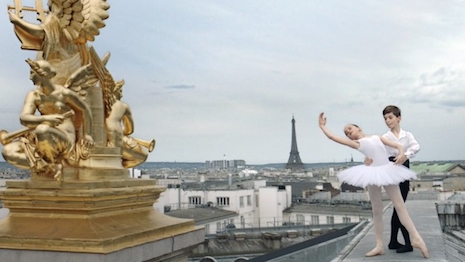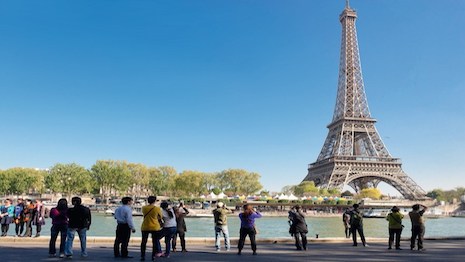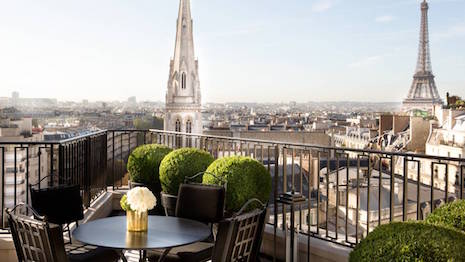 Fear of terrorist attacks can be an obstacle for tourism. Still from Paris' tourism film by Jalil Lespert
Fear of terrorist attacks can be an obstacle for tourism. Still from Paris' tourism film by Jalil Lespert
NEW YORK – Despite facing geopolitical and technological disruptions, 2018 is shaping up to be a record year for the travel industry.
According to panelists on the “State of the Travel Industry” session at the 2018 New York Times Travel Show Jan. 26, the year ahead will continue momentum seen in 2017, after declines in 2015 and 2016 due to terrorism, currency fluctuations and notably, for the United States’ tourism sector, the Trump Administration. While the “U.S. brand” is hurting, in-demand markets such as Europe and Africa are seeing interest return while destinations including Israel and Cuba continue to attract travelers.
“I think, without a doubt, there has been weakened [U.S. travel] demand,” said Ninan Chacko, CEO of Travel Leaders Group. “When I saw the data from the last seven months of last year, there was about a 4 percent decrease, $4.5 billion in terms of [negative] impact to the economy and 40,000 jobs [lost].
“With all the focus on domestic economy, as much as maybe the majority of our businesses are not impacted by inbound,” he said. “This absolutely has an impact on the economy and image, identity of the United States and on the American traveler.”
Just book it
As the U.S. travel segment works on “everyone is welcome” campaigns to combat the decrease in inbound visitors, the stock market’s positive performance has been beneficial for outbound travel rates.
Likewise, the euro’s continued appreciation against the U.S. dollar has resulted in an increase in European inbound visitors visiting the U.S.
But, President Trump’s rhetoric and policy has resulted in U.S. arrivals from the Middle East declining by 30 percent. Even though this Middle Eastern demographic is small in comparison to say China, the U.S. travel segment is seeing less interest overall, which has been harmful for the country’s economy.
“The number of [U.S. inbound] tourists is still huge, but traditionally the U.S. was number one in terms of revenue and number two in terms of international passengers for many years,” said Alejandro Zozaya, CEO of Apple Leisure Group. “Number two after France and number three was Spain.
“Spain grew 20 percent [last year] and U.S. declined anywhere between 4 and 6 percent overall, so now we’re number three, which is not so bad either,” he said.
France sees the most international visitors of any country. Image credit: Atout France.
Destinations abroad have been noting great traffic from consumers.
Jennifer Tombaugh, president of Tauck, shared that its tour service has seen a 60 percent increase in interest in Israel while African nations are “on fire." Australia and New Zealand are also widely popular.
Following the refugee crisis and a number of terror attacks, Europe has seen a strong and aggressive comeback in the last year.
The “4 Is,” the Iberian Peninsula, Ireland, Iceland and Italy, have maintained their popularity despite Europe’s current social and security challenges. After a challenging 2016, Central Europe is also seeing a rebound in inbound travel numbers.
Also, Cuba continues to see an interest from travelers, but there is a good amount of confusion on access due to U.S. policy changes. This confusion has benefited the cruising sector because group visits are organized and structured, lessening concerns for travelers, compared to people-to-people trips.
Nevertheless, Havana hotel occupancy rates have declined in part to damage from hurricane season and U.S. policy updates. Cuba noted huge growth in 2015 to 2016, and was opened to cruising in 2017, but the country saw overall interest soften (see story).
The Kempisnki Hotel is located within the Manzana de Gómez in Havana, Cuba . Image credit: Kempisnki
Elsewhere in the Caribbean, destinations such as St. Martin and Puerto Rico are still rebuilding following a devastating hurricane season. Interest in the eastern Caribbean saw about six weeks of weakened demand following Hurricane Maria, but demand has already rebounded demonstrating the resiliency of the travel industry.
Putting aside competition, the cruise industry, especially, has banded together to help rebuild the popular tourism destination. Norwegian Cruise Line’s president and CEO, Andrew Stuart, shared with attendees that the company raised $1.25 million, which it matched, making the total $2.5 million, to help rebuild schools damaged by hurricanes in the Caribbean.
Travel Leaders Group’s Mr. Chacko stressed that it is not just donations that will help rebuild the Caribbean. Instead, Travel Leaders Group worked to educate its travel agents on the region’s situation to make the biggest impact possible and restore the “life blood” of these islands.
In addition to weather happenings, travel agents must be able to reassure clients when travel warnings are issued. The panelists raised an interesting perspective on the topic of travel warnings when speaking of Mexico.
These travel warnings are all relative though. The panelists explained that while London and Paris have a Level 2 warning for U.S. travelers, cities such as Las Vegas, Chicago and New Orleans having the same tier of warning for foreign tourists.
To this point, moderator James Shillinglaw, a veteran travel journalist, asked if U.S. travelers are becoming more resilient in the face of weather, politics and terrorism.
Penthouse terrace at Four Seasons Hotel George V, Paris. Image credit: Four Seasons
Guy Young, global brand engagement officer at The Travel Corporation, said that the short answer is yes, and 48 hours after an event, normal activity returns. Factors that impact returning activity include how country responds via PR outreach and security measures.
Mr. Young explained that while France did a good job in response to its terror attacks, London rebounded faster due to incidences being more isolated, compared to the larger calculated attack Paris suffer in November 2015 (see story).
Market recovery after a disaster or terror event was much longer in the past, but has trickled down from a 12-month period a decade ago to just two days.
“With all of the noise out there, it’s really hard to know what’s real,” Tauck’s Ms. Tombaugh said. “I think people are tuning that noise out and saying, ‘We’re going to go. The market is doing well, all my savings are performing well, and I cannot wait.’
“There are so many shoes dropping constantly, that people are just getting up and going,” she said. “There’s a new normal out there, uncertainty is completely being redefined and the traveler is saying, ‘We’re going to go.’”
AI bookings
Aside from external disruptors, technology has impacted the travel industry from the inside via consumer behavior and sector experimentation.
One technology impacting this industry is the emergence of artificial intelligence and its role in online travel agent platforms (see story).
Although chatbots and OTA virtual assistants offer ease, convenience and utility, the panelists agreed that 2018 would be the year of the travel agent.
The role of the travel agent, fundamentally, is to understand consumers on a deep, personal level. While some camps of thought feel that AI will make the travel agent obsolete, the State of the Travel Industry panel agreed that the presence of virtual assistants is not a “zero sum game,” but instead has empowered agents.
With so much travel-related information, having an expert decipher the average 400 touchpoints consumers research before making a travel decision, a meaningful relationship is established that optimizes time and makes the overall process less overwhelming.
Despite best intentions, machines are limited in their abilities and are unable to replace human interaction, thus turning the tide back towards travel agents. For luxury hospitality, a combination of high tech and human touch is necessary.
“Technology is obviously great for enabling better guest experiences,” Travel Corporation’s Mr. Young said.
“Old fashion hospitality aligned with technology is so important and is key to a successful company, especially a niche, high-class luxury brand,” he said.



